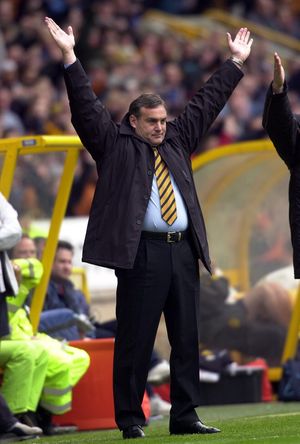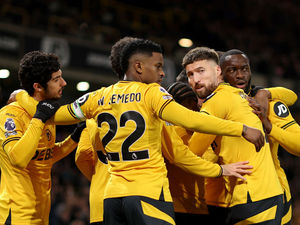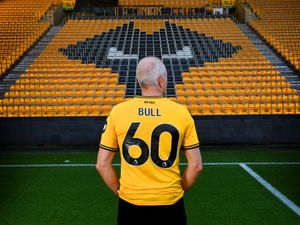Johnny Phillips: We must recall Wolves history as it really was
Revisionism reared its head this week when Fosun eventually replaced Paul Lambert and his backroom team at Wolves.
The past was being rewritten by those who don’t believe these owners are respecting the club’s traditions. There are valid questions to be asked of Fosun about the way they have been conducting their business. Good men on the coaching staff were left hanging for far too long, their fate sealed weeks ago in an episode that doesn’t reflect particularly well on the Chinese owners.
And we will never know if Lambert was the man to take Wolves back into the Premier League. He loved the job and had he been here under a different regime events may have played out differently. Lambert is no longer Fosun’s man and the club have shown their intention to lean heavily on super-agent Jorges Mendes and his thick contacts book in world football with the appointment of Nuno Espirito Santo.
It is not an unfamiliar business model in today’s game, although at Championship level it is relatively unproven and there are doubts about whether or not it will succeed. But suggestions that Fosun’s ownership is undoing the good work of predecessors and besmirching the name of the club are laughable. The line peddled, in some quarters, that Sir Jack Hayward would be looking down in anger shows a lack of understanding of the club’s history.
Sir Jack was a hugely popular local man who invested millions of his own money in rebuilding the ground after the previous owners, Jack Harris and Dick Homden’s consortium, had rescued the club from administration and Graham Turner, Steve Bull and Co had rebuilt it on the pitch. No-one can take away the bricks and mortar legacy of Sir Jack. Generous certainly, but a good owner?
As a tax exile in the Bahamas, Sir Jack left the day-to-day running of the club to his sons Jonathan, who was unsuited to the role and out of his depth, and later Rick, who was cut from the same cloth. It would be unfair to name him, but last month I spent an evening with one of the senior players in the early 1990s Wolves team who laughed out loud when I asked if Jonathan knew how to run a football club. Agents, managers and players had Wolves’ number in those days.
Money was wasted hand over fist throughout the 1990s and the board succumbed to fan and media pressure when relieving Graham Taylor of his job far too early. Even Sir Jack himself acknowledged his own mismanagement of the club he loved and how wasteful he had been. “They think the Golden Tit – me – will go on forever,” he lamented in 1997 as more cash was misspent during Mark McGhee’s era. By 1999 he was even suing his own son for the mismanagement of money at Molineux.
When Wolves eventually won promotion in 2003, manager Dave Jones was given no backing and all Sir Jack had to show for his 17 years in charge was a solitary Premier League campaign that petered out with a whimper. That’s not particularly good ownership.

Steve Morgan paid a tenner to Sir Jack for the club and inherited Mick McCarthy as manager. He got lucky, McCarthy delivered promotion. Substantial investment was made in the club’s training facilities as an extended Compton site delivered a superb academy as well as an estate full of Redrow Homes, but Morgan pulled the plug on a stadium redevelopment with only one stand rebuilt.
All the stability he brought off the pitch fell to pieces in the last Premier League season when McCarthy was ludicrously replaced by Terry Connor. The following season Stale Solbakken arrived from left field and was ushered out in favour of Dean Saunders as Wolves managed successive relegations down to the third tier with several players on the wage bill earning in excess of £40,000 a week. More good ownership.
There is nobody under the age of 40 who can recall a time when Wolves were both successful on the pitch and well run off it. The last major honour – the 1980 League Cup – was too long ago for my generation to have any memory of at all. Since then the club has fallen on desperate times, recovered well and muddled through to where it is today. There have been occasional highs but mainly mediocrity.
Wolves is a proud club, a founder member with an illustrious history, and it occupies a pivotal place in the local community. Those who work for Wolves care deeply and help make Molineux the fine place it is.
Fosun have upset the apple cart a bit. It wasn’t pleasant to see people like Rob Edwards and Tony Daley ushered out of the door in such a manner. But let’s wait and see what happens next. Many foreign owners have come into the British game with varying degrees of success.
Blackburn and Leicester were on a level footing a few years ago. The Venky’s have run Rovers into the ground and League One, whereas the Srivaddhanaprabha family have overseen a league title and Champions League football at Leicester.
What are those who bemoan the disappearance of Wolves’ traditions actually pining for? Where were these halcyon days in the last four decades? It is right to have reservations about the Fosun ownership model and it will require far more time before any lasting judgments can be made. But let’s be clear, Fosun don’t have a lot to live up to when it comes to running Wolverhampton Wanderers.





